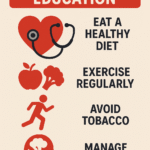
AI Solutions That Are Changing Healthcare Access
Healthcare Access Through AI
Importance of the Matter
In a time when health imbalances are still present, AI makes accessibility in healthcare a game changer, enabling an AI tool called health disparity. It is exceedingly helpful for :
- Patients: Fewer waiting times, more efficiency.
- Researchers: The latest information from the data.
- Providers: Services that are streamlined.
Key Takeaways
- Affordable solutions by AI mean better health outcomes.
- AI, however, is not only the possibility of a new kind of plurality in healthcare; it is more than this, as it breaks down the accessibility barriers.
- This trend is in line with our digital-first era, which is very appealing to the young people who make up the dynamics of this process. AI isn’t just a fancy concept but a way to create a healthier future for everyone.
Healthcare Access through Artificial Intelligence Technology_ A Historical Perspective
Presently, healthcare access to efficient and convenient service is a real challenge. As society changes, the need for low-priced new solutions becomes more immediate year after year. The breakdown of AI is causing this.
Innovation in Healthcare and Biotech
- AI has quickly progressed from the idea to being the healthcare systems’ glue.
- Innovations are completely rerouting the performance of patient care and the related price.
Impact on Medicine, Technology, and Public Health
- AI tools are cutting out the wait times. Hence, treatments are done faster and are less expensive.
- They bring about better diagnostic accuracy, which results in improved health.
- Over time, AI will strive for a “clinical socialism” by making healthcare accessible to all people. When intelligent algorithms are better at managing patient care than human healthcare providers motivated by money, a more just and sustainable healthcare system may be realized.
Current Landscape of AI in Healthcare
Transforming Accessibility
AI has brought about a significant breakthrough in healthcare. New tools that promote innovation are being used more often, costs are lower, and access to them is improved for everyone.
- Cost Reduction: AI is selling down care prices that are affordable to patients.
- Remote Diagnostics: Telemedicine and other virtual interactions are gaining traction, and patients are getting more flexibility in their appointment-making.
- Data Analysis: A prominent use of machine learning is for predictive algorithms to make the best decision on tailored care. The future is brighter—AI has enabled patients and their families, but the quest for the right solution in the healthcare field remains.
Impact on Patients, Families, and Public Health
AI intervention in patients’ lives is a game-changer and significantly impacts them. If you could visualize health advice at a one-click distance, it would massively change the way families handle their health-related problems.
Improvements in Treatments and Quality of Life
- Early Detection: The AI programs are well-trained to track patients and practice in favour of them. This will assist patients in receiving prompt care.
- Personalized Care: Individual treatment plans are proven most effective because they are uniquely beneficial.
- Affordability: Reducing costs makes the families pay less but receive more. Technology is no longer just a theory; it has a practical side affecting people’s lives daily.
- Patient Testimonial: “It’s only been a few days since I felt the very first typical symptom like the one that I used to have 4-6 weeks before the actual infection- frigid, no energy at all and relatively high fever (38. 5 degrees)
- So, medical assistance through AI is both convenient and a must for the future of health.
Impacts on Healthcare Professionals
Difficulties in adapting
One obstacle healthcare professionals face is transitioning from skills to AI tools. They are already under pressure, which can be challenging for them with limited time and existing responsibilities.
- Cost Implications: These applications are new technologies in healthcare and an opportunity for wisely managing budgets and expenses.
Ways to Upgrade Health Systems
In addition to the topics above, AI draws the line for better management of finances and thus enhances patient care.
- Performance Improved: For assistants whose time is taken up by non-urgent, routine issues, handheld devices and e-mail are helpful.
- Cost-Efficient Alternatives: Artificial intelligence has the potential to give the whole population high-quality healthcare access; thus, it forms the basis of the so-called democratization of the healthcare sector.
- Arising in unsteady, advancing AI does not allow humans to choose whether to adapt; they either do or do not get the “AI” bright future in healthcare.
The Move from AI to Accessible Healthcare
The Primary AI Advantages in Healthcare
The transformation healthcare has undergone with AI has gone beyond being fascinated by the technology; it’s a revolution that brings about more straightforward and cheaper treatment.
- Efficiency Restated: Automation in healthcare optimizes the delivery of care by decreasing the amount of paperwork
- Enhanced Patient Outcomes: Predictive analytics can detect earlier diseases, reducing the probability of health complications and ensuring good health.
Why This Matters
Can you picture a world where everyone can access healthcare? AI tools would make that possible through the following:
- Stating reasons for which hospitals are unapproachable
- Decreased expenses from process automation
- Using data-backed analytics, doctors will treat different patients differently. This is not just the progress being made but the empowerment it grants. Adapting to these developments for Gen Z and Gen Alpha means that future health includes opportunities available to everyone.
Challenges of Accessible Healthcare via AI
Ethical and Practical Concerns
The involvement of AI in the health sector comes with challenges, including the issue of privacy, which must be sorted out before anything adverse happens. This affects not only the researchers but also the regulatory bodies and patients.
- Data Privacy Risks: Patient information can be disclosed. Is your health data secure?
- Inequitable Access: Not all have the same access to technology. **Can every individual truly benefit from AI?
- Algorithmic Bias: AI might do the same thing society does, excluding some people. Has the technology left out some groups?
- Lack of Transparency: Advanced algorithms may render patients and practitioners hopeless. Do you know which criteria your treatment was based on?
- Regulatory Gaps: The existing guidelines may not be adequate to follow the speed of the technology progress. Are you at risk if the safety measures are violated? In these tech-enabled times, we need to pay attention and give our solutions to the problems. Understanding these challenges is a must to create a fair healthcare future.
Discovering Accessible Healthcare with AI
Embrace the Future of Health
AI is changing the healthcare landscape in a way that is affordable and accessible to all. How you can contribute are as follows:
- Use AI-powered apps: Get applications that integrate AI technologies that, in turn, enable you to schedule and fill prescriptions without human intervention. They could not only remind you to take your medication on time.
- Schedule virtual consultations: Interact with health specialists using simple platforms, including online consultations and online transactions. Thus, time and transport savings are possible.
- Leverage chatbots: Employ AI chatbots to fetch instant health advice and resolve common questions in certain hours when offices are closed. This bilateral communication ensures you an informative life all the time. Doing a little today can start the road to a healthier, better-informed future!
The Future of Accessible Healthcare via AI
Transformative Potential
AI is revolutionizing healthcare. Imagine a world where healthcare is run 24/7, anywhere.
- Personalized Medicine: Tailor treatment to personal genetics.
- Telemedicine: Around-the-clock portal to a doctor from any destination.
- Data Analytics: Clues to tell us how to avoid illness.
Career Opportunities in Biotech
The biotech landscape is on a fast track to change. New posts are appearing!
- AI Health Specialists: Uniting tech and patient care.
- Data Scientists: Sorting out massive data off health.
- Bioethicists: Making sure AI solutions are ethical and unbiased.
Stay Ahead of the Curve
The future because it will open up many opportunities. AI in healthcare has the potential for breakthroughs and offers rewarding career opportunities that could significantly impact the real world.
Key Takeaways on Accessible via AI
Why It Matters
The healthcare field is a fast-changing one. With AI, we can be the ones to build such instruments that bring healthcare within reach and to everyone at affordable rates.
Key Points to Keep in Mind
- Healthcare is being revolutionized through AI—it makes it efficient and personalized.
- Accessibility is the most essential part of public health development.
- Adoption of these trends is very crucial for healthier living.
Get Involved
Become more aware and act! Learn more about AI’s role in healthcare, and discuss issues with your doctor which could be resolved through the possibilities available to you.












Post Comment